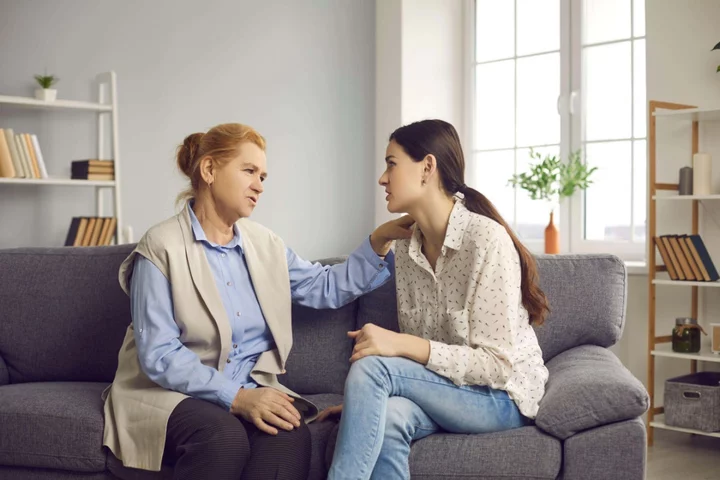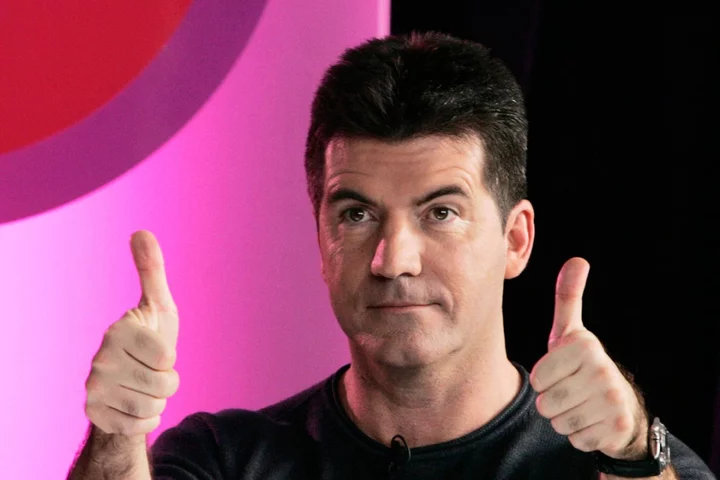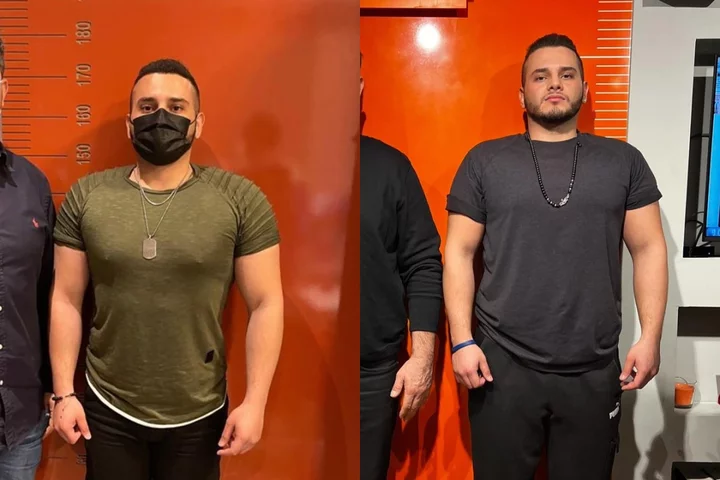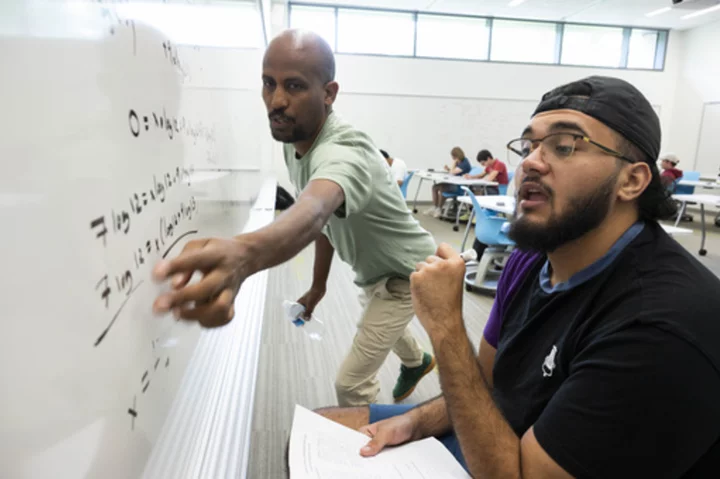
Alzheimer’s: How and when to talk to someone about their memory loss
You may have noticed someone close to you changing – perhaps they are more forgetful, not quite themselves. After a quick search online or a chat with family members or friends, you may be left thinking they’re developing Alzheimer’s. But how do you approach a conversation about dementia when it’s such an emotive topic? “As we get older, we’re all prone to becoming more forgetful, taking longer to remember certain things, getting distracted more easily or struggling to perform several tasks at once,” says head of knowledge at Alzheimer’s Society, Dr Tim Beanland. “These are common signs of getting older, but there is still a very sharp distinction between normal ageing and dementia.” Symptoms that may worry you “Symptoms of dementia gradually get worse over time,” Beanland explains, “and can appear as memory loss, confusion, needing help with everyday tasks, problems with language and understanding, or changes in behaviour. Although symptoms typically occur in people aged 65 and over, they can occasionally appear as early as twenty years sooner.” You may be scared Seeing these types of changes is understandably worrying – it’s a reminder of the age and health of those around us. “Noticing what might be dementia symptoms in a loved one can be distressing and confusing, particularly for people who have never dealt with dementia before,” Beanland says. “Both parties may feel nervous or worried about how to address the topic of potential dementia symptoms, and may not know where to begin.” Be open Beanland suggests asking questions like, ‘How are you feeling lately, physically and emotionally?’ Or ‘Do you have any health worries you’d like to talk about?’ It’s important to remember when approaching someone who may be experiencing dementia symptoms to do so gently, calmly and in a reassuring and supportive manner. “People experiencing dementia symptoms may find it difficult, or take a bit longer, to find the words they wish to say,” notes Beanland. “So, allowing them extra time, or giving them gentle prompts, can help them find the words they’re looking for, without highlighting they’ve forgotten something.” Do your research Dementia or Alzheimer’s may not be the only answer. It’s important to remember there are other conditions which can cause similar symptoms to dementia, such as thyroid problems or urinary tract infections, says Beanland. “Try to focus on helping the person see their GP, to find out what is causing the problems they are having. It’s also important to understand that, whether you are experiencing dementia symptoms personally or you’re a concerned loved one, you do not have to face dementia alone. There is support out there for you. “I’d encourage anyone worried about their own or a loved one’s memory to use Alzheimer’s Society’s symptoms checklist. It will help to unlock the vital care and support you need, and give you the precious time needed with your family to plan for the future.” Read More Charity boss speaks out over ‘traumatic’ encounter with royal aide Ukraine war’s heaviest fight rages in east - follow live As Simon Cowell shares positive therapy experience, how can it help even if you aren’t in crisis? Project launched to bust myth that cancer is a ‘white person’s disease’ 10 slick ways to kit out your student digs
2023-09-01 13:17

Asian Stocks Advance as China Steps Up Stimulus: Markets Wrap
Stocks in Asia rose as China rolled out more stimulus to aid its ailing economy and as traders
2023-09-01 11:19

Food ads are in the crosshairs as Burger King, others face lawsuits for false advertising
Food ads have long made their subjects look bigger, juicier and crispier than they are in real life
2023-09-01 06:51

Squeezing in one last summer trip over Labor Day weekend? Expect crowded airports and full flights
If you're squeezing in one last summer trip over the Labor Day weekend, expect lots of company
2023-09-01 01:22

Marijuana users have higher levels of toxic metals in blood and urine, study finds
People who use marijuana were found to have higher levels of lead and cadmium in their blood and urine, in comparison to those who do not use weed, according to a new study. The team of researchers at Columbia University analysed data from blood and urine samples collected between 2005 and 2018 as part of the National Health and Nutrition Examination Survey, a program conducted by the National Center for Health Statistics. They looked at samples of 7,254 people who said they had used marijuana in the last 30 days. Participants were examined for levels of heavy metals and 358 people were found to have 27 per cent higher blood lead levels than those who said they didn’t use either marijuana or tobacco. There were also 22 per cent higher levels of cadmium in those marijuana users according to the research, which was published Wednesday in the journal Environmental Health Perspectives. Researchers also found that the urine samples showed similar results. High levels of cadmium can cause stomach irritation, abdominal cramps, nausea, vomiting and diarrhoea, according to Better Health. Researchers found that although tobacco is the main source of cadmium exposure in the general population, the study showed similar exposure levels among cannabis users. “For both cadmium and lead, these metals are likely to stay in the body for years, long after exposure ends,” Tiffany Sanchez, an author of the study and an assistant professor of environmental health sciences at Columbia’s Mailman School of Public Health said to NBC News. As cannabis plants can absorb heavy metals from soil - the new findings demonstrate that heavy metals in cannabis plants can also wind up in the human body. “Previous studies have measured metals in marijuana plants, products, or marijuana smoke,” study authors have said. Lead exposure can be particularly harmful to children and pregnant women. In adults, chronic exposure to lead increases the risk of high blood pressure, heart problems and kidney damage. “Our study wasn’t able to tease apart whether or not self-reported cannabis users were using medical or recreational cannabis, so we can’t say definitively if medical cannabis users specifically had higher metal levels,” Sanchez said as reported by CNN. “This is something that should be evaluated in future studies.” Heavy metals bind to parts of your cells that prevent your organs from doing their job, according to the Cleveland Clinic and symptoms of heavy metal poisoning can be life-threatening and can cause irreversible damage. “Immunocompromised people, such as those going through chemotherapy, may be at greater risk from metal exposure or from other common cannabis contaminants like molds. However, this is very much an understudied area,” Sanchez added. On Wednesday, the Department of Health and Human Services recommended that the Drug Enforcement Administration ease restrictions on marijuana by moving it from Schedule I drug to Schedule III. HHS Secretary Xavier Becerra said on X, the platform formerly known as Twitter, that the agency has responded to President Joe Biden’s request “to provide a scheduling recommendation for marijuana to the DEA.” “We’ve worked to ensure that a scientific evaluation be completed and shared expeditiously,” he added. Senate Majority Leader Chuck Schumer said in a statement that HHS had recommended that marijuana be moved from a Schedule I to a Schedule III controlled substance. “HHS has done the right thing,” Schumer said. “DEA should now follow through on this important step to greatly reduce the harm caused by draconian marijuana laws.” Rescheduling the drug would reduce or potentially eliminate criminal penalties for possession. Marijuana is currently classified as a Schedule I drug, alongside heroin and LSD. According to the DEA, Schedule I drugs "have no currently accepted medical use in the United States, a lack of accepted safety for use under medical supervision, and a high potential for abuse." Additional reporting from agencies Read More Biden health agency recommends classifying marijuana as lower-risk, opening potential for major policy changes Seth Rogen reveals why he smokes marijuana ‘all day, every single day’ Rugby star Ugo Monye: Boarding school shaped my career and my personality Queen Latifah calls for more ‘inclusive healthcare’ for people with obesity As Simon Cowell shares positive therapy experience, how can it help even if you aren’t in crisis?
2023-09-01 00:46

Rugby star Ugo Monye: Boarding school shaped my career and my personality
The Rugby World Cup and new series of Strictly Come Dancing are both set to kick off soon – and one man who knows just how hard both of them are is Ugo Monye. “Strictly is gruelling,” says the former rugby pro-turned-pundit, who played with Harlequins and England before taking part in Strictly in 2021. “At times you’re training for 12 hours a day. So, you could go for a period of three or four days where all you do is wake up, go to the studio, go to sleep, wake up, go to the studio, go to bed.” He recalls recently telling his friend, comedian Eddie Kadi, all about this, the night before he was announced as a contestant for this year’s show. And because of the demanding schedule, taking care of yourself becomes a top priority. “You try and eat right, try and get as much sleep as possible. The biggest initial challenge everyone will find is their feet, because they wouldn’t have been used to dancing for 11 hours a day,” adds Monye, 40, who was partnered with Oti Mabuse on the show. Trading his rugby boots for ballroom shoes came with some challenges, but he still completed five weeks on the show (Monye and Mabuse finished in 11th place that year). “I remember when I did the quickstep, I had my smart watch on, which showed that I danced over 45km in five days,” he recalls. “I remember the first week or two, just the nervousness of rolling out of bed and putting my feet on the carpet because you didn’t know how they would feel.” Having played such a physically demanding sport for 13 years at pro level, Monye was not in bad shape. But Strictly was another “type of pressure”. “When I retired in 2015, I never thought that I’d be dancing, dressed in a low cut, electric pink, short sleeve shirt doing the samba. It’s something I’m actually really proud of,” he adds happily. Like lots of people, Monye, who has two daughters – Phoenix Lilly, six, and Ruby, three, with his ex-wife Lucy – recalls how his approach to self-care has evolved over the years. “Going back to the early 2000s, I was living the dream, right? I was 18 and I got a professional contract playing for my boyhood club, and within a year I travelled the world playing for England,” he says. “I was all, what mental health? I’m flying, right?” Things shifted with time, however, and he began to see the importance of having a proactive approach to maintaining his mental wellbeing. “I remember speaking to a friend, who is really interested in mental health, [about how] people often seek [mental health support] after something bad or traumatic has happened to a point where they actually need it. But it’s more like how you have to go and get an MOT on your car and service it,” he explains. “I think towards the end of my career, I became more aware of it. I have now definitely paid more attention to it and I absolutely love psychology, so I love understanding how the mind works.” Since his retirement, Monye – who has teamed up with Samsung ahead of the World Cup, which starts on September 8 – he has been busy being a dad, alongside jumping into a vibrant broadcast career. Having daughters made him reflect on his own upbringing too – going from being raised by a single mother on a London council estate, to a rural boarding school in Hampshire where he had his education funded (Monye secured a sports scholarship when he was 13). He attributes a lot of his success to his schooling. “I think the person I am now was born at age 13. Everything I was surrounded by was slightly different in that world. It was where I first was introduced to rugby, which then has quite clearly gone on to shape my career, the pathway that I have now, but also my personality. “I think I rely upon myself, I back myself. I had to depend on myself and try and get things done,” he reflects. “I think my personality traits, good and bad, were all developed at boarding school.” Having spent large chunks of his childhood away from family, how does he manage his own work-life balance as a parent now? “How do you manage your work-life balance? Well, you stand in the middle of the park taking a phone call,” he jokes (Monye is in the playground with his girls while we talk). “The time I have with them is absolute quality. For the World Cup, I’m going out for like three or four stints. I’d love them to be able to come out, but with school, it is a bit more difficult. “But I have said to Phoenix already that next year is the Olympics, and she loves gymnastics, so she’s going to be getting on the Eurostar with me. She is watching a lot of clips of Simone Biles at the moment on YouTube and she’s obsessed.” He wants to see his daughters inspired by brilliant women. “I love to watch sports with my daughters,” says Monye. “And we loved watching the Women’s World Cup. I had to get them to come and watch incredible women just do it.” Ugo Monye has teamed up with Samsung to help the nation see the new laws clearly and watch the match in supersize, thanks to the Samsung 98” Q80C TV (samsung.com/uk/big-screen-tv). Read More Charity boss speaks out over ‘traumatic’ encounter with royal aide Ukraine war’s heaviest fight rages in east - follow live As Simon Cowell shares positive therapy experience, how can it help even if you aren’t in crisis? Project launched to bust myth that cancer is a ‘white person’s disease’ 10 slick ways to kit out your student digs
2023-08-31 23:25

Queen Latifah calls for more ‘inclusive healthcare’ for people with obesity
Queen Latifah is calling for more inclusive medical care for people with obesity. In a new interview as part of her work with It’s Bigger Than Me, a US-based campaign by healthcare company Novo Nordisk, the actor and rapper recounted how many people with obesity experience weight discrimination from medical staff. Sharing her personal connection to the issue, the Girls Trip star – whose real name Dana Owens – toldPeople: “I saw my cousin have to deal with this issue – she was morbidly obese and she went in and out of the hospital. “There were so many things she had to face. And for a doctor to just say, ‘Oh, you need to lose some weight.’ Well, it’s not that easy. Everyone’s bodies are not the same. We all deserve specific individual care.” Latifah, 53, backed the campaign’s call for “inclusive obesity care” ensuring everyone can feel “welcome and respected” when they visit the doctors. “Imagine how good it must feel when a patient walks through that door and sees the appropriate chairs or office set-up, that someone has considered them, has taken the time to think about what their needs are,” the Hairspray star said. “There’s a sense of, ‘I’m respected here. I’m welcome here’... If you’re discouraged to get into your doctor’s office, then that’s not a good thing.” When a person is defined as obese, this means that they are overweight “with a lot of body fat”, the NHS says. The World Health Organisation (WHO) explains that the terms “overweight” and “obesity” are used to refer to “abnormal or excessive fat accumulation that presents a risk to health”. It is estimated 64 per cent of adults in the UK are obese or overweight. Last summer, a British study found that obese patients were being “weight-shamed by doctors and nurses”, with weight stigmatisation pushing patients to skip appointments. The stigmatisation leads to patients avoiding appointments, feeling depressed or anxious and being more likely to put on weight, scientists said. The British researchers said there needed to be better education for medics over “weight stigma” to avoid this spilling into healthcare. The scientists looked at more than 3,000 research articles on the topic to identify strategies to tackle negative biases towards overweight and obese patients. In doing so, this could help to tackle the UK’s obesity crisis, as negative biases over weight limit access to healthcare services and treatment. Read More Joe Wicks defends decision to pull five-year-old daughter out of school Woman adopts husband’s ex-wife’s son after growing up in foster care herself Man who went to Turkey to make himself taller says pain was ‘worth it’ As Simon Cowell shares positive therapy experience, how can it help even if you aren’t in crisis? Man who went to Turkey to make himself taller says pain was ‘worth it’ Terminally ill mum prepares for worst after numb hand turns out to be deadly disease
2023-08-31 22:17

As Simon Cowell shares positive therapy experience, how can it help even if you aren’t in crisis?
X Factor boss Simon Cowell, 63, has shared that having discovered therapy in the past year, he feels as though “a weight has lifted off my shoulders”. The music mogul, who is behind The X Factor and Britain’s Got Talent, said he wished he had seen a therapist “10 or 20 years ago” in a recent interview with the Daily Mirror. He also shared that the deaths of his parents and the coronavirus pandemic had affected his mental health. Seeking therapy has been transformative for Cowell and it could do the same for you, whether you are in crisis, or just want to learn more about yourself. Cowell has said engaging in therapy had a “super positive effect” on his life and encouraged others to do the same, so here’s what you should know. There are different types of therapy Contrary to what many people may believe, counselling, where you sit and talk through events and reflect, is not the only form of therapy. “There are a whole host of different types of therapies available, from counselling, cognitive behavioural therapy, mindfulness-based cognitive therapy, acceptance and commitment therapy, interpersonal therapy, psychodynamic psychotherapy to eye movement desensitization and reprocessing,” explains psychologist and author of The Self-Care Revolution, Suzy Reading.Each one can have a different role in helping you get to know yourself better, handling trauma, feeling more grounded and coping more day-to-day. Therapy isn’t just for rock bottom Therapy doesn’t have to be a last resort. “When it comes to therapy, there are no hard and fast rules,” says Liz Ritchie, a St Andrew’s Healthcare psychotherapist. “Many people associate seeking help with crisis, but there is no reason why you cannot maintain regular sessions with your therapist. There is now a wealth of evidence that supports that therapy can also be a preventative form of mental healthcare, a little bit like going to a dentist or a doctor. “Life is busy and stressful, which means we don’t often have time to process cross words with a loved one, work altercations or issues with friends and family members.” You’ll understand yourself better You may think you understand yourself totally, but there are always new parts of ourselves to get to know. “Therapy helps us better understand ourselves, our relationships and the world, connecting us with how we feel, and why we might feel as we do. It is a journey of self-discovery, helping us appreciate our strengths and identify our values,” says Reading. It could give you an emotional toolkitIt can be helpful to have “an impartial sounding board to speak openly and honestly and the opportunity to be heard, validated and understood”, says Reading. “Therapy helps us challenge unhelpful thoughts, dispute self-limiting beliefs and can help us create new habits. Therapy is also about developing healthy ways to move through our emotions, creating a fresh toolkit of coping strategies and can be very practical in nature by helping us address specific challenges or goals.” But… it isn’t easy Unfortunately getting therapy is not always easy. If you do not have the financial freedom to be able to pay for a private therapist, you may be faced with long waiting lists and restrictive services. However, NHS therapy is an option and can be really helpful, so be sure to look into the options you can afford near you. Reading recommends checking out BPS and HCPC to find a qualified therapist. NHS resources can be accessed here. If you are seriously struggling with your mental health, and are at risk, please call 999 or the Samaritans on 116 123.
2023-08-31 20:54

Clergy dish up meatball sundaes, pickle ice pops and a little faith at the Minnesota State Fair
Faith has a deep-rooted presence at the Minnesota State Fair, from the decades-old Lutheran and Methodist dining halls to an evangelical chapel handing out thousands of free Bibles to a booth seeking to combat misinformation about Islam
2023-08-31 20:27

Man who lengthened his limbs by three inches feels ‘so much happier’
A Canadian man has had limb-lengthening surgery, costing £25,000, to increase his height from 5ft 7in to 5ft 10in as he was so insecure about his height it caused him to have “suicidal thoughts”, and claims he is now “so much happier” and “confident”. Daniel Farbod, 27, a civil engineer, from Toronto, Canada, has been self-conscious of his height “all (his) life” – when he stopped growing, at age 14, he said it felt “tragic” and like his “first stab to the heart.” Daniel always defined “being masculine” as being tall, and was “ashamed” of himself as he “didn’t feel like a man.” Over time, being taller was all Daniel could dream about, and claimed his height “impacted his mental health so badly” that he was having “suicidal thoughts”. After coming across the unique surgery online, he realised he was “willing to sacrifice time and money to get (his) life back.” So, in May 2021, he had his first procedure in a specialist clinic in Turkey, which involved breaking his femurs, hollowing out the bone, and putting a rod inside the bone with external fixators, pieces of steel on the outside of his legs. Daniel had to turn the fixators with an Allen key every day for over four months, and eventually had his second surgery to remove the fixators after his bones had successfully fused together. When Daniel recovered, he could not “put into words how happy (he) was” and “felt so much more confident”, now, he is sharing his journey on social media to inspire others who are insecure about their height. Daniel told PA Real Life: “I’m really proud of myself for having the surgery. “I was insecure all my life about my height, it impacted my mental health so badly. “I was suicidal, and after admitting that I wanted to take the steps to feel better, and have the surgery, I feel so much better. “I think for other people, it is important to know how tough the surgery and recovery is – it was the hardest thing I’ve ever done, but for me, it changed my life and made me grow not only literally but also metaphorically as a person.” Daniel, who has always been self-conscious about his height, stopped growing at age 14, and became obsessed with finding ways to become taller. He said: “I researched everything from socks and supplements that claimed to increase your height. “I was always insecure and worried about it – I used to go to orthopaedic doctors because I was so scared of not growing. “But when I got to age 14, I stopped and it was so depressing.” When it became clear to Daniel that he was unlikely to grow any more, it took a toll on his mental health and confidence. He explained: “It was so tragic for me, it was like my first stab to the heart. “All my dreams would be about being taller and I had to somehow accept that my height had peaked. “I tried to keep myself busy to manage my thoughts but in 2020 I just couldn’t handle it – I had all of these negative thoughts and suicidal thoughts because I think being masculine, and being a man, means to be tall. “I didn’t feel like a man, I was so ashamed.” Daniel felt as though having limb-lengthening surgery was the only way he was going to feel better, but his parents, who are both “on the shorter side”, did not approve of his decision to have cosmetic surgery. He said: “Everyone was really against the idea because they thought it was not natural and it was changing the way your body is meant to be. “I knew the surgery was going to be tough, but I thought even that pain would be better than having suicidal thoughts. “I was willing to sacrifice time and money to get my life back.” In May 2021, Daniel had his first surgery in a specialist clinic, Live Life Taller, in Turkey, which involved breaking both of his femurs, hollowing out the bone, and putting a rod inside the bone with external fixators – pieces of steel on the outside of his legs. He explained: “I was really scared when I got to the clinic, and the breaking of the bones was the part I was most nervous about in the whole process. “It was crazy to wake up after the surgery – the reality just hit me all at once and I was so happy.” His recovery involved being in a wheelchair and using an Allen key to turn a bolt on the fixators four times a day at 90 degrees to separate the bone segments a little at a time. Daniel continued to do this every day for four and a half months, saying of his painful recovery: “My skin was stretching, my muscles were growing, it was madness. “It took me even longer to recover, they usually say it will take three months, but, my I had nerve issues with my right leg and had to have it broken again. “It was a very tough time.” In September 2021, the external fixators were removed, he explained: “I used a walker and really really slowly I worked up to using crutches. “I couldn’t really tell how tall I was at that point. “It took me at least another three months to be able to stand up.” Mr Farbod went from 5 ft 7 to 5ft 10 and thinks his mental health has dramatically improved as a result. He said: “I couldn’t believe it. I had been dreaming of being a tall man since I was 10 years old, it’s all I’ve ever wanted. “I went through all these sleepless nights, trauma and upset, and I finally achieved my goal. “I can’t even put into words how happy I was, and still am – I felt so much more confident.” When Mr Farbod arrived home, his family were also very happy for him. He said: “They looked after me so much – I could barely get out of bed or bend down for a long time. “They could tell I was so much happier when I recovered.” Now, Daniel shares his journey on Instagram and YouTube to inspire others who are insecure about their height. He said: “I want to show people the reality of the surgery – it’s tough but I want to raise awareness and get men talking about their insecurities.” For support, contact the Samaritans on 116 123, email them at jo@samaritans.org, or visit samaritans.org to find your nearest branch. Read More Charity boss speaks out over ‘traumatic’ encounter with royal aide Ukraine war’s heaviest fight rages in east - follow live 10 slick ways to kit out your student digs 4 essential officecore trends to update your work wardrobe Sickle Cell Awareness Month: What is sickle cell disease and how do you know if you have it?
2023-08-31 16:52

Some US airports strive to make flying more inclusive for those with dementia
With over 14 million people expected to check into airports nationwide for Labor Day weekend, a number of them inevitably will be travelers with dementia or some sort of cognitive impairment
2023-08-31 12:53

College students are still struggling with basic math. Professors blame the pandemic
U.S. colleges are searching for solutions as they see alarming numbers of students arrive with gaps in their math skills
2023-08-31 12:45
